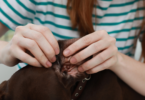Welcome to the wild world of pet parenthood, where every sneeze is a potential crisis and that innocent-looking sock could be your dog's next emergency room visit! If you've ever found yourself Googling “Can dogs get the flu?” at 3 AM or wondering if your cat's sudden obsession with your houseplant is cause for alarm, you're in good company. Let's dive into the roller coaster of worries that come with keeping our furry friends healthy and safe.
The Sneaky Snackers: When Pets Eat the Unthinkable
We've all been there. You turn your back for one second, and suddenly your dog is chomping on something that definitely isn't kibble. As veterinarian Dr. Marty Becker puts it, “Dogs have a superpower: the ability to find and eat the most inappropriate things at the most inconvenient times.”
One dog owner shared, “I once caught my Labrador trying to swallow a whole corn cob. It was like watching a magician attempt to stuff a balloon down his throat. Spoiler alert: We ended up at the emergency vet.”
Common household items that pets love to eat (but definitely shouldn't):
1. Socks and Underwear: The Fabric Feast
For some reason, many dogs find our dirty laundry irresistible. One exasperated owner confessed, “My dog has expensive taste. He only eats designer socks. I'm considering charging him rent.”
2. Toys and Stuffing: The Plush Buffet
From squeaky toys to stuffed animals, some pets can't resist the allure of synthetic stuffing. As one cat owner put it, “My cat thinks she's a surgeon, expertly removing the stuffing from every toy. I'm considering enrolling her in medical school.”
3. Rocks and Sticks: The Outdoor Appetizers
Some dogs seem to think the backyard is an all-you-can-eat buffet. One owner joked, “My dog's favorite game is ‘Rock or Treat?' I never know if he's bringing me a stone or a biscuit. It's like a really high-stakes version of Russian Roulette.”
4. Hair Ties and Rubber Bands: The Elastic Entree
Cats, in particular, seem drawn to these stretchy menaces. As one vet tech shared, “I once assisted in removing 57 hair ties from a cat's stomach. It was like a magician's endless handkerchief trick, but much less fun.”
The Toxic Temptations: When Common Items Turn Dangerous
It's not just non-food items we need to worry about. Many common household products and foods can be toxic to our pets. As veterinarian Dr. Karen Becker warns, “What's harmless to us can be lethal to our pets. It's crucial for pet owners to be aware of potential toxins in their home.”
Some surprising toxic items:
1. Xylitol: The Sweet Menace
This sugar substitute, found in many sugar-free products, can cause rapid blood sugar drops and liver failure in dogs. One owner shared, “I never knew sugar-free gum could be deadly. Now, I treat xylitol like it's radioactive.”
2. Grapes and Raisins: The Fruity Foe
These innocent-looking fruits can cause kidney failure in dogs. As one puzzled owner put it, “My dog can eat his own poop without issue, but a grape could kill him. The logic escapes me.”
3. Lilies: The Feline Fatality
Many lilies are extremely toxic to cats, causing kidney failure even in small amounts. One cat owner lamented, “I had to become a botanist overnight. Now, I interrogate every flower that enters my house like it's a suspect in a crime drama.”
4. Onions and Garlic: The Savory Saboteurs
These kitchen staples can cause anemia in both dogs and cats. As one pet nutritionist joked, “Apparently, my pets are secretly vampires. They must avoid garlic at all costs.”
The Injury Insanity: When Playtime Goes Wrong
Our pets' enthusiasm for life can sometimes lead to unexpected injuries. From the infamous “dog vs. porcupine” showdown to the classic “cat vs. gravity” experiment, our furry friends seem to find new and creative ways to hurt themselves.
One dog owner shared, “My dog once got so excited about chasing a squirrel that he ran full-speed into a tree. He was fine, but I think the squirrel is still laughing.”
Common injuries to watch out for:
1. Cruciate Ligament Ruptures: The Canine Sports Injury
This knee injury is common in active dogs, especially larger breeds. As one owner put it, “My dog tore his ACL chasing a ball. Now he thinks he's a professional athlete on the disabled list.”
2. Tooth Fractures: The Chewing Champion's Downfall
Overzealous chewing on hard objects can lead to broken teeth. One vet shared, “I once removed a piece of antler from a dog's fractured tooth. Apparently, he thought he was part wolf.”
3. High-Rise Syndrome: The Feline Flying Lesson
Cats falling from high places is so common it has its own name. One cat owner confessed, “My cat's attempts to catch birds from our 10th-floor balcony aged me 10 years in 10 seconds.”
4. Foxtails: The Botanical Bandit
These seemingly innocent grass awns can burrow into a pet's skin, causing serious issues. As one rural dog owner shared, “I spend more time checking my dog for foxtails than I do checking my own social media. It's like a really un-fun version of Where's Waldo.”
The Illness Anxiety: When Every Sneeze is a Potential Crisis
From the common cold to more serious conditions, illness is a constant worry for pet owners. As veterinarian Dr. Andy Roark puts it, “Pets can't tell us when they're feeling under the weather, so it's up to us to be their health detectives.”
One cat owner shared, “My cat sneezed once, and I was convinced she had the plague. Turns out, she just sniffed my pepper shaker. I'm considering bubble-wrapping her for safety.”
Common health concerns:
1. Cancer: The Big C
Cancer is a leading cause of death in older pets. As one owner who's been through it said, “Fighting cancer with my dog taught me more about strength and resilience than any self-help book ever could.”
2. Dental Disease: The Silent Tooth Killer
Periodontal disease is extremely common in pets and can lead to serious health issues. One vet joked, “I've seen cleaner teeth on sharks. At least they have an excuse – they can't hold a toothbrush!”
3. Obesity: The Weighty Issue
Just like humans, many pets struggle with weight issues. As one chunky cat's owner put it, “My cat's not fat, he's just big-furred. At least, that's what I tell myself as I put him on his fifth diet this year.”
4. Arthritis: The Creaky Conundrum
Many older pets suffer from arthritis. One senior dog owner shared, “My old boy and I have a lot in common now. We both groan when we get up and prefer naps to long walks.”
The Parasite Paranoia: Tiny Terrors
From fleas and ticks to heartworms and intestinal worms, parasites are a constant concern for pet owners. As parasitologist Dr. Dwight Bowman says, “Parasites are nature's hitchhikers, always looking for a free ride and a free meal.”
One dog owner confessed, “I've become a parasite detective. Every speck of dirt is a potential flea. Every blade of grass could be harboring ticks. I'm pretty sure I can spot a mosquito from a mile away now.”
Common parasite problems:
1. Fleas: The Itchy Invaders
These tiny terrors can make life miserable for pets and owners alike. As one cat owner put it, “I never knew such tiny creatures could cause such huge problems. It's like dealing with an army of invisible vampires.”
2. Ticks: The Creepy Crawlers
Ticks can transmit serious diseases to pets and humans. One outdoorsy dog owner shared, “Our post-hike tick checks have become a bonding ritual. Nothing says ‘I love you' like meticulously combing through fur for blood-sucking parasites.”
3. Heartworms: The Silent Killers
These dangerous parasites can cause serious heart and lung disease. As one vet tech explained, “Explaining heartworm prevention to pet owners is like teaching calculus to kindergarteners. It's complicated, but skipping it can have dire consequences.”
4. Intestinal Worms: The Gut Gremlins
From roundworms to tapeworms, these internal parasites can cause a host of problems. One new puppy owner lamented, “I never thought I'd spend so much time examining poop. It's like I've become a scatologist overnight.”
The Breed-Specific Worries: When Genetics Come into Play
Different breeds come with different health concerns, adding another layer to our worry cake. As veterinary geneticist Dr. Jerold Bell puts it, “Breed-specific health issues are like family traits – some are charming, others… not so much.”
One Bulldog owner shared, “I've become an expert in wrinkle care. It's like having a Shar Pei, but with more snoring and less personal space.”
Some breed-specific concerns:
1. Brachycephalic Issues: The Flat-Faced Dilemma
Breeds with short noses, like Pugs and French Bulldogs, can struggle with breathing issues. As one Pug owner put it, “My dog's snoring could wake the dead. I'm considering marketing him as a white noise machine.”
2. Hip Dysplasia: The Large Breed Curse
Many large breeds are prone to hip problems. One German Shepherd owner shared, “I spend more time massaging my dog's hips than I do my own. I'm considering a career change to canine chiropractor.”
3. Heart Issues: The Cavalier's Cross
Certain breeds, like Cavalier King Charles Spaniels, are prone to heart problems. As one owner said, “My Cavalier has stolen my heart, but I worry constantly about hers.”
4. Allergies: The Itchy and Scratchy Show
Some breeds, like West Highland White Terriers, are more prone to skin allergies. One Westie owner joked, “I've spent so much on allergy treatments, I'm considering just covering my dog in bubble wrap.”
The Senior Pet Stress: When Age is More Than Just a Number
As our pets age, new health concerns arise. As veterinary gerontologist Dr. Mary Gardner says, “Getting old isn't for the faint of heart, whether you have two legs or four.”
One senior cat owner shared, “My 18-year-old cat has more medical issues than my grandma. Between the special diet, daily medications, and frequent vet visits, I feel like I'm running a feline nursing home.”
Common senior pet concerns:
1. Cognitive Dysfunction: The Doggy Dementia
Many older pets experience cognitive decline. As one owner of a senior dog put it, “My old boy sometimes forgets where he is. The other day, he barked at his own reflection. I can relate – I often can't remember why I walked into a room.”
2. Kidney Disease: The Silent Stalker
Kidney issues are common in older pets, especially cats. One cat owner shared, “I never thought I'd become an expert in feline hydration, but here I am, comparing water fountains like they're fine wines.”
3. Vision and Hearing Loss: The Sensory Slide
Many pets experience decreased vision and hearing as they age. As one owner of a deaf dog said, “We've developed our own sign language. It's like living with a furry mime.”
4. Incontinence: The Leaky Dilemma
Some older pets struggle with bladder control. One senior dog owner joked, “I've become an expert in strategic towel placement. It's like living in a doggy water park, but less fun.”
The Emotional Rollercoaster: When Worry Becomes a Way of Life
Being a pet owner means signing up for a lifetime of worry. As animal behaviorist Patricia McConnell puts it, “Loving a dog or cat is like having a permanent piece of your heart walking around outside your body.”
One anxious pet owner confessed, “I've developed a sixth sense for potential dangers. I can spot a dropped pill from across the room and sense an open toilet lid from two floors away. It's my superpower, but I'd trade it for a good night's sleep in a heartbeat.”
Coping strategies for the worried pet parent:
1. Education is Key
The more you know, the better prepared you'll be. As one vet suggested, “Knowledge is power. The more you understand about pet health, the less you'll panic over every little thing.”
2. Build a Support Network
From your vet to fellow pet owners, having a support system is crucial. One owner shared, “My dog's health scare brought me closer to other pet owners in my neighborhood. We've formed a sort of ‘Worried Pet Parents Anonymous' group.”
3. Prepare for Emergencies
Having a plan in place can ease anxiety. As one prepared owner put it, “I have an emergency vet kit that rivals most hospitals. I'm considering adding a tiny defibrillator, just in case.”
4. Practice Self-Care
Remember to take care of yourself too. As one wise pet owner said, “I realized I can't pour from an empty cup. Taking care of myself helps me take better care of my pets.”
5. Embrace the Joy
Amidst all the worry, don't forget to enjoy your time with your pet. As one long-time pet owner beautifully put it, “Yes, I worry. But the joy my pets bring me far outweighs any anxiety. Every day with them is a gift, even if that gift sometimes comes with a vet bill.”











Leave a Comment